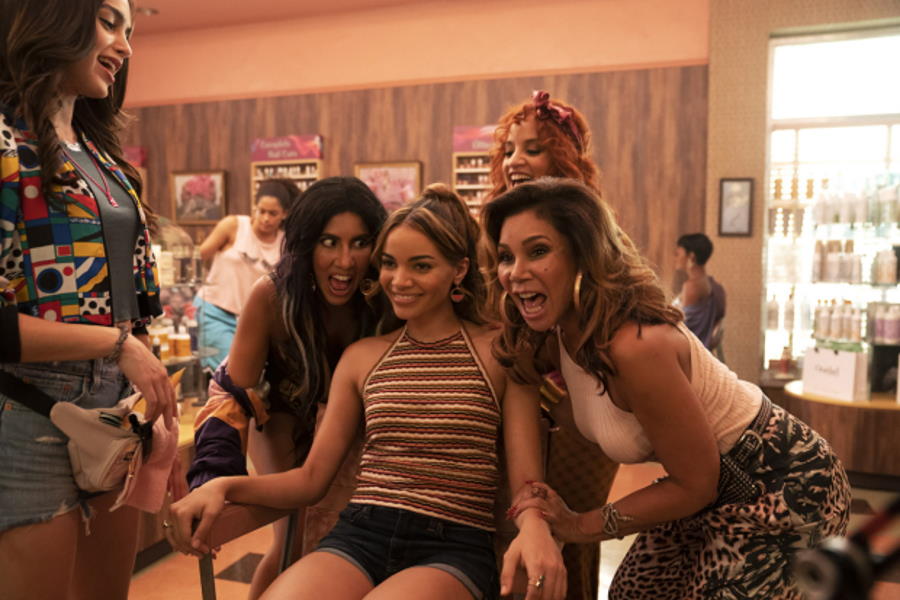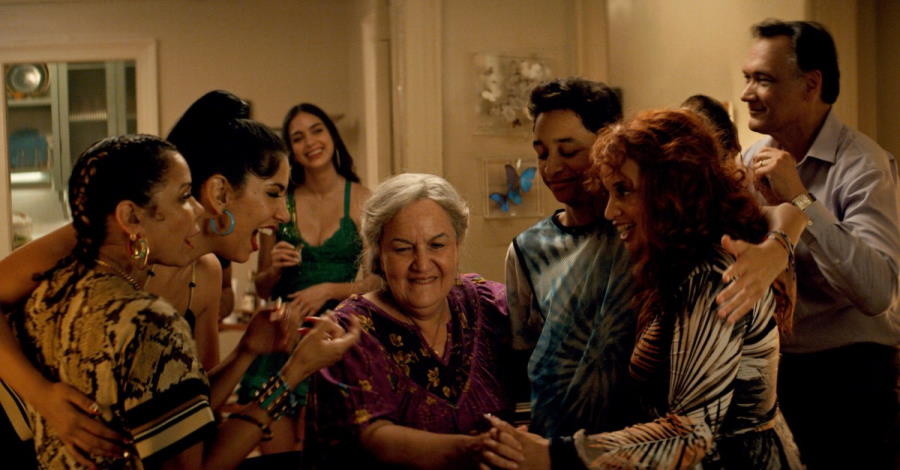On Saturday mornings when I was growing up, my family divided into two groups. My dad and younger brothers took a ball and assorted equipment to go to soccer practice. My mom and I packed a couple of magazines and headed to Lia’s. The steep slope where the small beauty shop was located could not compete with the towering bouffants requested by customers. Hair that tall could not be filled with anything but knowledge.
Sitting under the bonnet hair dryer, I pretended to be a space explorer learning about the practices and traditions of the inhabitants of distant planets. It was in that beauty shop where I took up Christmas crafting, joined #TeamLadyDi, and learned that I had eyelashes “anyone would sell their soul for.”
I thought about those languorous Saturday mornings constantly while watching the exhilarating new film adaptation of In the Heights, which opens at theatres and begins streaming on HBO Max starting June 10. Especially during scenes set in Daniela’s salon, a sanctuary where chisme and wisdom flow in equal measure, a temple where women recharge and beautify the armor they need to continue being the pillars of Latine culture.
“Grooming is a way of grooming,” explained Daphne Rubin-Vega (she/her), who plays Daniela in the film, referring to the multifaceted nurturing of a place where “women take care of their own.” A beauty shop, she said, is “where you celebrate your individuality, your beauty, inside and out. I love to add that we also provide childcare.”

The sharing of cross-generational knowledge, particularly as passed to and among women, is at the center of In the Heights. In the film’s new framing device, Usnavi (Anthony Ramos) is telling the story of how his “sueñito” came to be to a group of children, including his young daughter. Screenwriter Quiara Alegría Hudes (she/her), who adapted the book of the Tony-winning stage musical she co-wrote with Lin-Manuel Miranda, found inspiration for Daniela’s in her abuela’s house in North Philadelphia, a home with an “open door policy” that allowed people from various communities to come in and out throughout the day, wanting to bask in her abuela’s light.
“[At abuela’s] you would get a sense of the pulse of the neighborhood,” Hudes told me. “It was lively and gentle at the same time. People would be dyeing their hair upstairs and then come down to hang out while the dye was setting in.” This was the place where Hudes likely fine-tuned her ability to listen for the conversations and voices many others ignore or fail to acknowledge. “People didn’t come to [abuela] for counsel—they came to her for safety,” she said.
This is the kind of safety that emanates from the character of Abuela Claudia (Olga Merediz), the matriarch who rules over the sizzling Washington Heights of the movie. In Claudia, the film finds its moral and spiritual center; her spine is sturdier than the Empire State, her wisdom and kindness as constant as the Hudson.
As a child, Merediz (she/her) similarly looked up to her mother, who had collected doctorate and master’s degrees in 1940s Havana, and who in turn taught her that “when you fail, you pick yourself up and try again.” In the monumental number “Paciencia y Fe,” Merediz—reprising the role that got her a Tony nomination—seems possessed by the spirit of the countless women whose shoulders she stands upon. “I had to make everyone proud,” Merediz explained. “I took my mother, my friends’ mothers, and wanted to deliver this quintessential matriarch.”
Leslie Grace (she/her), who plays the young Nina in the film, remembers her own abuela fondly. “She’s my everything,” Grace effused. Her grandmother, Grace recalled, left the Dominican Republic to scrub floors and clean homes in New York City until she was able to afford her own apartment. Grace has another link to the world of the musical, also matrilineal: She grew up in a “real life Daniela’s,” as her family owned a beauty shop, and her “first job was washing hair at my mom’s. It’s where I learned my work ethic, earning every cent you have, and how to fight for your dreams.”
Melissa Barrera (she/her), who plays Vanessa, also comes from a line of “superstar” matriarchs. “My mom practically raised my sisters and me on her own,” she recalled. “I never stopped learning from her, because she is the smartest, kindest woman I know,” she adds. Growing up in Monterrey, Mexcico, Barrera was raised on a diet of her abuela’s “arroz dorado,” and telenovelas. As a child she would watch Thalía’s Marias, and when she herself became a telenovela star, “My mom would watch them all,” she said with a grin.
Like most of the women in the film, Barrera is an immigrant, having left her native Mexico to move to the “mecca of musical theatre” in New York City. Likewise Vanessa craves nothing more than to leave her neighborhood for a place downtown, the only place where she thinks her dreams can be realized.
Hudes’s sensitive screenplay perfectly captures the in-between space where immigrants often live. “As a child of the Diaspora I’m always in two places at once,” she explained. “Our spiritual reality and our physical reality as migrants and immigrants contradicts the idea that home is one place,” she said. “Home is not necessarily where we are, but it can also be where we are.”
Said Barrera, “I grew up in Monterrey, and I never noticed the mountains that surrounded me my entire life until I came back. I was like, those have been there the entire time?”
For Latinas today and in the years to come, In the Heights will serve as a figurative beauty shop: a place where they too can come to be groomed, looked after, cared for. “Let me tell you about stuff before the world breaks your heart,” said Rubin-Vega. It’s an invitation that’s simply impossible to resist.
Jose Solís (he/him) is a frequent contributor to this magazine.


